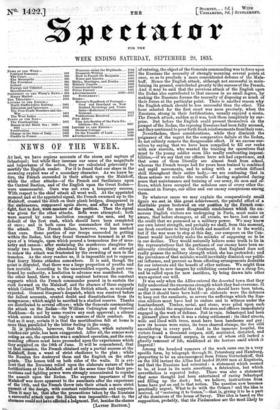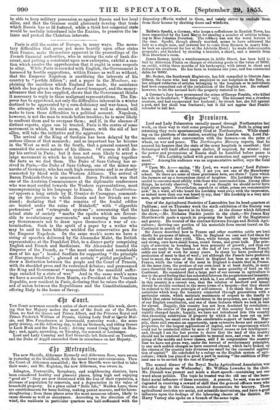NEWS OF THE WEEK.
AT last, we have copious accounts of the storm and capture of Sebastopol; but while they increase our sense of the magnitude and importance of the action, they are calculated grievously to mortify the English reader. For it is found that our share in the crowning exploit was of a secondary character. As we knew be- fore, the French succeeded in their attack upon the Malakoff, while the other attacks—of the French and Sardinians upon the Central Bastion, and of the English upon the Great Redan- were unsuccessful. Oars was not even a temporary success. With.respect to the chief attack all went well. At the appointed moment and at the appointed signal, the French swarmed up to the Malakoff, crossed the ditch on their plank bridges, disappeared in the embrasures, reappeared again above, and after a sharp hot fight, foot to foot, were• masters of the position. Then the signal was given for the other attacks. Beth were attempted; both were marred by some hesitation amongst the men, and by default of the first rush, which should have been completed at once; and in both eases the commanders did not renew the attack. The French failure, however, was less marked than ours. Some portion of our troops succeeded in getting within the Redan, but they found themselves hemmed in at the apex of a triangle, upon which poured a tremendous fire of mus- ketry and cannon: after sustaining the murderous slaughter for nearly two hours, they abandoned the place ; and an attempt to renew the attack was frustrated by the crowding of men in the trenches. As the story reaches us, it is impossible not to suppose that heavy blame attaches somewhere. It is said, though the point is disputed, that there was a large proportion of youths and raw recruits.' According to the unaccredited reports, in part con- firmed by authority, a hesitation to advance was manifested. On the other hand, there is a strong contrast between the constant supports which the French commander poured in to sustain the rush forward on the Malakoff, and the absence of those supports which Colonel Windham, who led the British attack, so anxiously expected. General Simpson's despatch, which was received before the fullest accounts, created doubt and dissatisfaction from its meagreness; which might be ascribed to a studied reserve. Thanks are distributed to several officers ; while the Generals commanding the attack on the Redan—Sir William Codrington and General Markham—do not by name receive any such approval; a silence which seems intended to imply a censure of their conduct. Be that as it may, certain it is that the mortification felt at home is more than paralleled by the bitter feeling in the camp.
It is probable, however, that the failure, which naturally touches our pride, has been exaggerated. After all, the armies were acting as one, the operation was a combined operation, and the com- manding officers must have proceeded upon the experiences which they acquired on the 18th of June. It will be remembered, that on that occasion, the French obtained only a partial success at the Malakoff, from a want of strict obedience to the plan ; while the Russian fire destroyed them and the English on the other points. The lesson told on both sides of the walls. It is evi- dent that the Russians relied upon the elaborate nature of their fortifications at the Malakoff, and at the same time that their pre- cautions and fighting power were strongly concentrated to repulse the assault upon the Redan. The supreme importance of the Malakoff was more apparent to the assailants after the experience of the 18th, and the French threw into their attack a more strict pursuit of the design, with constant reinforcements and supports. Thend may be, that after the precautions taken by the Russians a successful attack upon the Redan was impossible—that is, the stormers could not have effected a lodgment. 'Tut, besides the chance
of entering, the object of the Generals commanding was to force upon the Russians the necessity of strongly manning several points at once, so as to preclude a more concentrated defence of the Mala- koff. Hence the English attack, although not successful in main- taining its ground, contributed greatly to the success of the French. And it may be said that the previous attack of the English upon the Redan also contributed to that success in no small degree, by making the Russians foresee the necessity of disposing so much of their forces at the particular point. There is another reason why the English attack should be less successful than the other. The hour selected for the first onset was noon precisely, when the Russians, strong in their fortifications, usually enjoyed a siesta. The French attack, sudden as it was, took them completely by sur- prise. But before the English could present themselves on the parapet of the Redan, the reposing Russians had been fully aroused, and they continued to pour forth fresh reinforcements from their rear.
Nevertheless, these considerations, while they diminish the poignancy of the regret for the comparative failure at the Redan, do not entirely remove the disagreeable effect. If we excuse our- selves by saying that we have been compelled to fill our ranks
with raw recruits, who wanted the training for operations that must to the young soldier seem like madly confronting impossi. bilities,—if we say that our officers have not had experience, and that some of them literally are almost fresh from school, whereas the French troops had for years been trained to combined and rapid movements, and to acting with a certain diffused skill throughout their entire body,—we are confessing that in these actions we realize the results of having neglected daring peace that maintenance and training of our army, its men and of- ficers, which have occupied the sedulous care of every other Go- vernment in Europe, our allies and our enemy conspicuous among them.
By whatever cause we may explain the comparatively small figure we out in this great achievement, the painful effect of a charitable praise bestowed on our position by the French com- mando*, and the more disagreeable condolences which the nu- merous English visitors are undergoing in Paris, must make us aware, that before strangers, at all events, we have lost some of the credit that we possessed as a military power. We may know our own latent strength, and probably we shall, from this moment, use fresh exertions to bring it forth and manifest it to the world; but if the war were to stop at this day, our compeers on the Con- tinent would inevitably make the mistake of supposing us to be in our decline. They would naturally believe some truth to lie in the representations that the partisans of our enemy have been as- siduously circulating on the Continent, that England does not really possess the military strength which she has pretended ; and the prevalence of that mistake would inevitably diminish our politi- cal influence, and prevent us from effecting arrangements desirable for our interests and the benefit of other nations. We might thus be exposed to new dangers by exhibiting ourselves as a cheap foe, and be called upon for new sacrifices, by being drawn into other wars against our will.
It was only when the Allies entered the deserted town that they fully understood the enormous strength which they had overcome. It really seems as wonderful that the place should have been taken, as that it should have been held—so elaborate were the defences to keep out the assailants, so severe the sufferings which the Rus- sian soldiers must have had to endure and to witness under the bombardment. Timber, metal, and stone, were piled upon each other to shield the magazines and the men and officers immediately engaged ia the work of defence. But in vain. Sebastopol had been a pleasant place when it was a rising settlement : its chief streets, wide and lined with trees, must have been handsome and gay : now its houses were ruins, its trees charred stumps, the fire still smouldering in every part. And in the immense hospital, the victors found a thousand corpses, stiff, mutilated, distorted, and decaying—a thousand corpses, in some of whom still lurked .a ghastly remnant- of life, maddened at the horrors amid which it lingered !
Among the hundred rumours of the week came one in a very specific form, by telegraph through St. Petersburg and Hamburg, purporting to be an announcement from Prince Gortschakoff, that on the 23d instant the Allies had landed 20,000 men at Eupatona, and that the Russians had retreated : a statement which seemed to be, at least in its main assertions, a fabrication, but which nevertheless is repeated today. There was also a statement that some thought had been entertained of razing Sebastopol and filling up the dock ; but, we believe, instructions from home have put an end to that notion. The creation now becomes practically urgent, What to do with the Crimea ? and the idea is revived, of "restoring it to Genoa,"—that is, giving it to be a part of the dominions of the house of Savoy. This idea is based on the supposition, probably, that the Piedmontese are the most likely te be able to keep military possession as against Russia and her local allies, and that the Genoese could gloriously develop that trade which Russia has so ill fostered, while a third but congenial state would be usefully introduced into the Euxine, to preserve the ba- lance and protect the Christian interests.



































 Previous page
Previous page